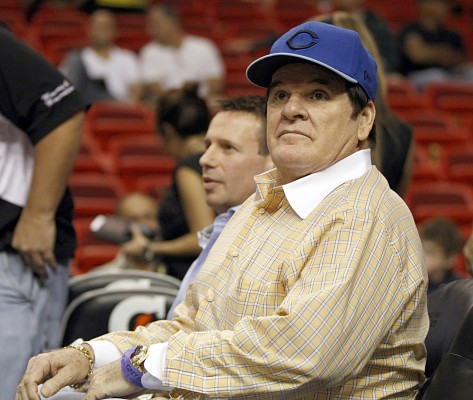Sports Gambling would Compromise the Integrity of Sports
MCT
Pete Rose was a part of one of the biggest sports betting controversies in history. (Pedro Portal/El Nuevo Herald VIA TNS)
October 5, 2015
If New Jersey were to legalize sports gambling within its borders, it would set a precedent for other states to also legalize it. Today, in all states except Nevada, sports gambling is illegal. There have been multiple scandals surrounding sports betting. Most of these scandals involve the fixing of games which ultimately compromise the integrity of the game.
One of the reasons that sports games are so popular is because they are live events where the outcome is a mystery. People will watch just to find out if a team won or lost. Sports gambling, if it were to become legal, would lead to the fixing of games. Fixed games take away the authenticity of the ending, which is where the excitement and magic of live sports happen.
Previous scandals have been made on both the professional and collegiate levels, and all have ended in legal trouble. Legalization of sports betting would cause a significantly smaller risk to those involved.
In 1978-79, Boston College was involved in a point shaving scandal. It all started with Rocco and Anthony Perla, two brothers who foresaw big bucks with the 1978-79 Boston College men’s basketball team. They recruited Rick Kuhn, a senior on the team, who was projected to be a key player. His job was to ensure that the team would fall short of the point spread, which is the number of points a team is projected, by gamblers, to win or lose by. If he succeeded, he would make around $2,500 per game. Sure enough, he accepted the offer and brought other top players into the scandal.
On Feb. 3, 1979 Boston College defeated Fordham University by seven points after being projected to win by 10 points, a successful game in the eyes of Kuhn. This game, along with others, contributed to $100,000 total made by players and up to $250,000 made by gamblers, all due to the point shaving system they had created. The scandal was uncovered in 1980 and the Perla brothers and Kuhn were both sentenced to ten years in prison. Kuhn’s sentence was later reduced to 28 months in prison.
A recent scandal involved the University of San Diego men’s basketball team. In 2010, assistant coach Thaddeus Brown, all time school leader in points and assists, Brandon Johnson, Brandon Dowry and seven other players were all guilty of fixing the outcome to one or more games in the 2010 season for gambling purposes. Dowry and Brown even tried recruiting a player for the purpose of fixing a game.
Major League Baseball (MLB) has also had some major gambling scandals throughout history. During the 1919 World Series, eight Chicago White Sox players were given money from gamblers to purposely lose the game. James J. “Sport” Sullivan is the gambler that initiated the fix. The eight players included favorites “Shoeless” Joe Jackson, “Sleepy” Bill Burns and Eddie Cicotte. After they were accused and tried, all eight players were indefinitely banned from organized baseball.
In the late 1980s, Pete Rose, the manager for the Cincinnati Reds, bet on his own team while holding the job title. In 1987, he bet on 52 Reds games making a minimum of $10,000 a game. Once an investigation was started, he was banned from baseball for life.
If sports gambling was legalized, fixed games could very well become the reality. In all of these instances, the integrity of the game was compromised for money. Cheating defeats the entire purpose of sports, which is the better team winning or losing. Some of our greatest memories have been watching our teams succeed where they earned a win that they deserved. Why would we want to compromise that?













Casey • Oct 9, 2015 at 10:58 pm
This has to be one of the worst articles I have ever read. You rely on archaic examples of 1979 and 1919 to prove how bad gambling is lol. Hate to burst your bubble but gambling is already going on in Vegas and the games are still going on okay.